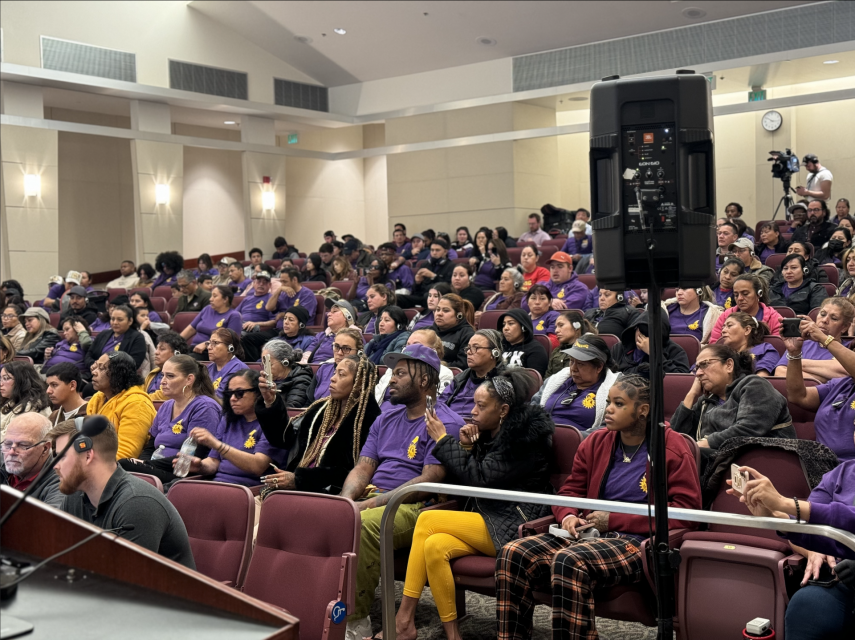
Fast food workers hold rally in celebration of inaugural meeting of Fast Food Council
Workers across California demand Council address poverty wages, unstable hours, and harsh work conditions
On Friday, March 16, fast food workers from across California held a rally after the Fast Food Council’s inaugural meeting to demand the statewide body develop more robust industry-wide standards regarding poverty pay, working hours, and harsh workplace conditions.
At the rally, cooks and cashiers showed their support for fast food workers Anniesha Williams and Angelica Hernandez, whom Governor Newsom appointed to the Council earlier this month. Workers also cheered on SEIU Executive Vice President Joseph Bryant and California Fast Food Workers Union Statewide Director Maria Maldonado, two longtime worker advocates named to the Council.
“This is a historic day. Over the last decade, fast food workers have fought and organized to reach this point where we’re sitting with the leaders of one of the fastest-growing industries in the State of California,” said SEIU EVP Joseph Bryant. ”Over 550,000 cashiers and cooks are represented here—that wouldn’t have happened without everybody here today.”
SEIU 1021 VP of Organizing Brandon Dawkins also noted, “This is an amazing day to see the Fast Food Council come together after years of organizing. This means we can look these decision-makers face-to-face and demonstrate our power. This means the lowest-paid workers will be lifted up.”
The first meeting of the Fast Food Council comes ten years after California cooks and cashiers launched the Fight for $15 and a union. At a February convening, fast-food worker leaders announced the formation of the California Fast Food Workers Union, which unites fast-food workers across brands and locations and stands out as the first of its kind in the country. At the convention, workers identified three core priorities for the Fast Food Council:
- Fair, Family-sustaining Wages: The upcoming raise to $20/hr is a meaningful step toward lifting fast-food workers and their families out of poverty. However, as the cost of living steadily rises, workers need to be able to keep up with inflation, tackle housing insecurity, and more. At the Council, workers campaigned for the best annual raises under the landmark FAST Recovery Act, a 3.5% yearly increase during the first 3-year standards cycle of the Fast Food Council.
- Fair Working Hours: Income insecurity isn’t solved by a raise alone. Workers are focused on stabilizing the erratic nature of their work. At the Council, workers demanded rules to ensure workers are scheduled enough hours to sustain themselves and their families and new protections against unfair, at-will firings. These standards combat one of the most potent weapons fast-food employers leverage against workers who assert their rights on the job: illegal retaliation in the form of cut hours and unjust firings.
- Fair Working Conditions: For years, fast-food workers have exposed an industry in crisis through hundreds of strikes and regulatory complaints. Wage theft. Excessive heat. Violence at work. Sexual harassment. Discrimination. Retaliation for speaking out. Through the Council, workers will continue to work with existing state agencies to commission investigations into these and other urgent issues and identify potential industry-specific solutions.
It was a day of inspiring solidarity and a promising look at the future as fast food workers unite across the state to continue speaking out and collectively fighting for their rights.

